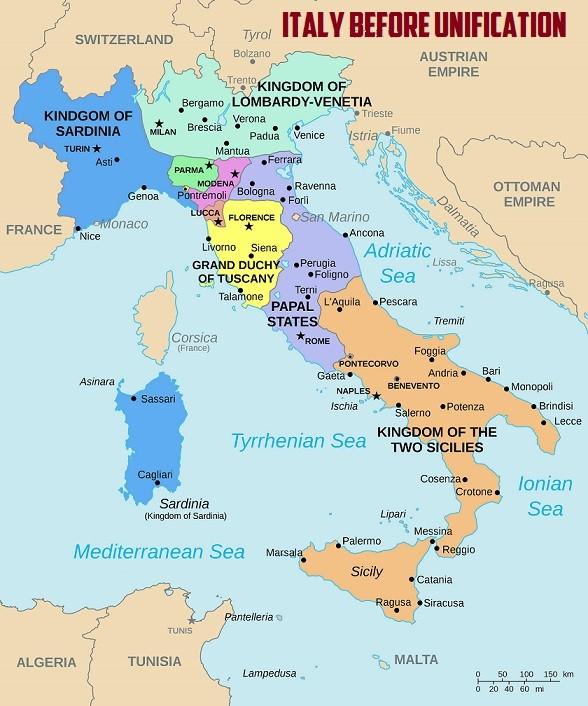Which of the Following Factors Caused German and Italian Unification
Italian unification was difficult to achieve because of the following reasons- Regional differences kept the nation from being truly united. Pope Pius IX wanted to accept the unification only if he was going to be the leader.

The Unification Of Germany And Italy
As a matter of fact excepting Piedmont all others were opposed to it.

. The religious war that divided Europe in 1800s. Sardinia-Piedmont became the leader of the Italian unification as a result of all of the following factors except A the failure of Mazzinis style of democratic nationalism in 1848. Garibaldi supported by his legion of Red Shirts-- mostly young Italian democrats who.
Widespread poverty caused many Italians to emigrate. The correct answer among all the other options is A. Italian Unification was more complex than German unification.
Which of the following factors caused German and Italian unification. The three wars that Prussia fought with Denmark Austria and France also played significant. Risorgimento was the name of the Italian movement that led to the unification of diverse territories in that region.
In 1929 the pope officially recognized Italy as a nation with its capital at Rome. THIS IS THE BEST ANSWER. -During the reign of Napoleon Italy was unified for a brief time.
There was no collaboration among the princes of Italy for Italian unification. The history of unified cooperation among states and cities states. In the nineteenth century German and Italy both underwent radical unification movements to integrate the independent states.
The process began in 1815 with the Congress of Vienna acting as a detonator and was completed in 1871 when Rome became the capital. Giuseppe Mazzini and his leading pupil Giuseppe Garibaldi failed in their attempt to create an Italy united by democracy. Southerners resented the rule by north.
The same was the case with the Austrian rulers of Parma Modena and Tuscany. Italy had not been a single political unit since the fall of the Western Roman Empire in the 5th century. The separate states up until this time were independent Prussia being the strongest and most influential followed by Austria.
Which of the following factors caused German and Italian unification. The Congress of Vienna which encouraged Europe to look to the future. Napoleons conquests stirred feelings of nationalism in that people began to experience a new sense of unity.
Bismarck and Cavour were very talented and wise men in the tactics they used. The chief cause of the unification of Germany in 1990 was the weakening and disintegration of the Soviet Union the nation that had previously blocked that move. D Victor Emmanuels granting of a.
Thanks for posting your question. The Congress of Vienna which encouraged Europe to look to the future. Which of the following factors caused German and Italian unification.
Which of the following statements best describes Napoleons role in the nineteenth century movements to unify Germany and Italy. The German and Italian unification began with the rising tides of nationalism and liberalism. Revival of democratic revolutions and nationalism.
B Pope Pius IXs rejection of Italian unification. From nationalism a desire for unification was born. Pope did not recognise Italy as a legitimate nation.
The unification of Germany and Italy was centered around the belief of nationalism. This is a factor that led to the unification of Germany and Italy. The revival of democratic revolutions and nationalism.
Causes for unification -Germany was divided and economically disadvantaged-The desire for economic growth-The success of the American Revolution and the experience of the Napoleonic Wars. The factors that caused the unification of Italy and Germany were the revival of democratic revolutions and nationalism. Each countrys unification efforts shared some similarities in addition to some differences due to the events occurring in Europe at the time as a result of cultural diffusion.
There are several contributing factors to the unification of Germany the most influential of which being the leadership of Otto Von Bismarck. The revival of democratic revolutions and nationalism. Unemployment rising taxes led to rioting and violence.
Austria Lombardy and Venetia were opposed to Italian unification. They controlled Bohemia and Hungary. The correct answer is A the revival of democratic revolutions and nationalism.
Main events-In 1848 power of the German states shifted to the liberals. Both knew which countries to ally and which to. This is a powerpoint presentation I created for my high school World History students for our unit on Nationalism.
Very few people thought in terms of Italy as a whole. The revival of democratic revolutions and nationalism. I hope this answer helped you.
March 6 2012 at 919 pm. The factors that caused the unification of Italy and Germany were the revival of democratic revolutions and nationalism. The English meaning is resurgence.
Also known as Risorgimento the Italian Unification was a political and social movement that consolidated different states of the Italian peninsula into a single state of the Kingdom of Italy in the 19th century. Furthermore what factors caused German and Italian unification. The movement to unite Italy into one cultural and political entity was known as the Risorgimento literally resurgence.
One of the biggest similarities in the unification of Italy and Germany were the stong leaders that piloted the movements. Ideologies that supported the unification movement Nationalism. In the 1860s Prussia under Bismarck used force to unify the various German states.

Italian And German Unification Crash Course European History 27 Youtube
Chapter 12 The Unifications Of Italy And Germany In Contested Visions The History Of Western Civilization From 1648 On Openalg
Chapter 12 The Unifications Of Italy And Germany In Contested Visions The History Of Western Civilization From 1648 On Openalg
No comments for "Which of the Following Factors Caused German and Italian Unification"
Post a Comment